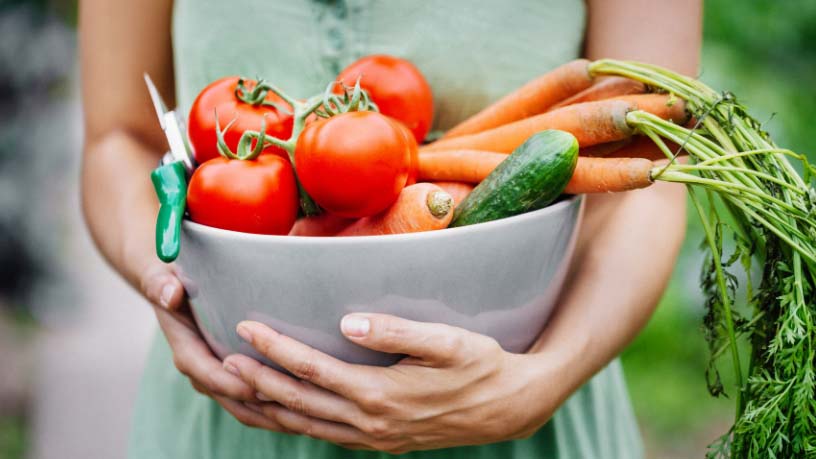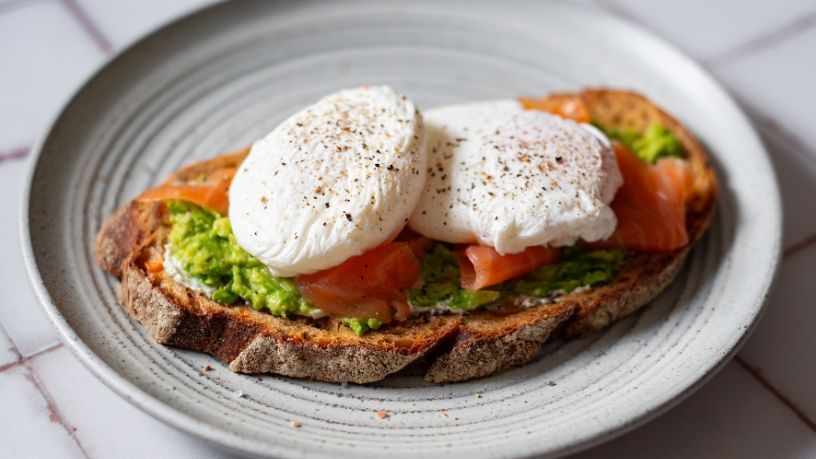Ever wondered if potatoes are a nutrient-rich staple or a carby treat?
Key takeaways
Despite their sometimes-bad reputation, spuds are packed full of health benefits and nutritional value.
Discover some healthy ways you can prepare and cook your potatoes, including dietitian-approved recipes.
When it comes to eating healthily, it’s important to incorporate a balanced diet of grains, protein, dairy (or alternatives), fruit and, you guessed it, vegetables.
But can potatoes count as one of your 5 a day veggies?
Here, we look at the nutritional benefits of the humble potato, with some tips for making it a healthy part of your diet.
The benefits of potatoes
Potatoes are one of the more misunderstood vegetables. They’re often cast as carb-loaded and unhealthy, but the truth is, when consumed correctly, they’re packed full of goodness.
As well as being low in kilojoules (a medium-sized potato contains around 460 kilojoules), potatoes are full of important nutrients, including:
- vitamin C
- vitamin B6
- potassium
- choline.1
In fact, potatoes are “one of the largest contributors to vitamin C intake in this country,” says Bupa Dietitian, Heather Ko.
Starchy root vegetables like potatoes are also rich sources of carbohydrates, which, alongside fats and protein, is an important component of a balanced diet.2
“When we consume potatoes, the body breaks down long starch chains into smaller glucose units to provide energy for our body,” says Ko.
The specific nutritional benefits largely come down to the type of spud you consume. You’re probably well-acquainted with white potato regulars like the Dutch Cream and Golden Delight, but there are loads of great alternatives out there too.
Some of Ko’s favourites include:
- orange sweet potatoes. These low-GI potatoes are digested more slowly than other varieties, reducing spikes in your blood glucose levels and leaving you fuller for longer. They are also rich in vitamin A, with powerful antioxidant properties that keep your eyes, lungs and skin healthy.
- purple potatoes. Whether they’re purple-skinned or have purple flesh, these vibrant spuds get their colour from anthocyanins, natural plant compounds with antioxidant properties. Research suggests anthocyanins may support heart and eye health, and help protect cells from age-related damage
So, do potatoes count as one of your 5 a day?
Given their powerful nutritional value, potatoes can indeed be included in a healthy, balanced diet. And eating the right amount can count as one of your 5 daily servings of fruit and veg.
That said, there are some important exceptions.
“Issues arise when we overconsume the recommended portion,” says Ko. “Variety is the spice of life, so aim for many different coloured veggies on your plate and ramp up your non-starchy vegetable intake.”
Likewise, the way potatoes are prepared makes all the difference. You’re not going to get the same benefits if they’re cooked in oils that are “high in saturated fat and served with fatty, creamy accompaniments,” says Ko.
So, unfortunately, that serving of takeaway hot chips probably doesn’t count.
For the best outcome, Ko recommends adding half a medium-sized potato with minimal added fat to a day’s meal, and leaving the skin on for added fibre.
You could also try cooking then cooling your spud, which gives it a higher amount of resistant starch.
“Resistant starch is an excellent way to boost your gut microbiome and keep your immune system functioning at its peak,” Ko adds.
How to spruce up your spud (while keeping it healthy)
If a plain boiled potato doesn’t seem appealing enough, there are a bunch of ways to make things interesting. Here are Ko’s top variations:
- Homemade hot chips. Start by cutting your potatoes into finger-width strips, then lightly coat them with olive oil and bake at 200°C until crunchy. Season to taste.
- Healthy mashed potatoes. Peel your potatoes, then steam or boil them until soft. Mash together with low-fat milk and olive oil or margarine. Season to taste and add a small amount of garlic for an extra flavour hit.
- Loaded roast spuds. Lightly coat a medium-sized potato in olive oil, then bake until soft. Once cooked, top with your own variation of lean minced beef, chicken breast, shredded turkey, corn kernels, diced tomatoes, capsicum, spinach leaves, low-fat cheese, Greek yoghurt and other healthy toppings.

At Bupa, trust is everything
Our health and wellbeing information is regularly reviewed and maintained by a team of healthcare experts, to ensure its relevancy and accuracy. Everyone's health journey is unique and health outcomes vary from person to person.
This content is not a replacement for personalised and specific medical, healthcare, or other professional advice. If you have concerns about your health, see your doctor or other health professional.
1Robertson, T. M., Alzaabi, A. Z., Robertson, M. D., & Fielding, B. A. (2014). Starchy Carbohydrates in a Healthy Diet: The Role of the Humble Potato. Nutrients, 10(11), 1,764.
2Healthdirect. (2023). Carbohydrates. Healthdirect.
You might also like...
Vegetarian and plant-based diets: What’s the difference?
Food trends may come and go, but eating more plants and less meat might be here to stay.
Is it time to up your fibre intake?
Fibre can help prevent bowel problems and keep us feeling well, but most of us aren't eating enough. Are you?
Is coffee good or bad for you?
More than one in 4 of us admit we can’t get through the day without a coffee. But can you have too much of a good thing? And is coffee even healthy?
Why eggs are good for you
The humble egg is packed with protein and plenty of nutrients, and is now recommended as part of a healthy diet.





